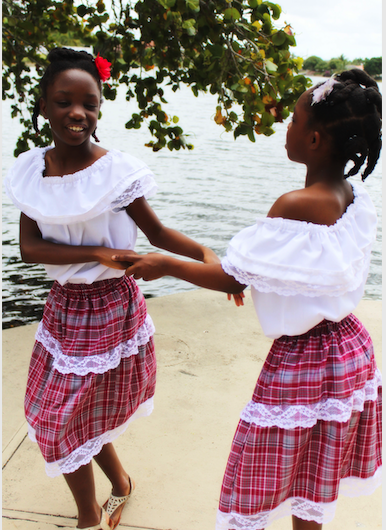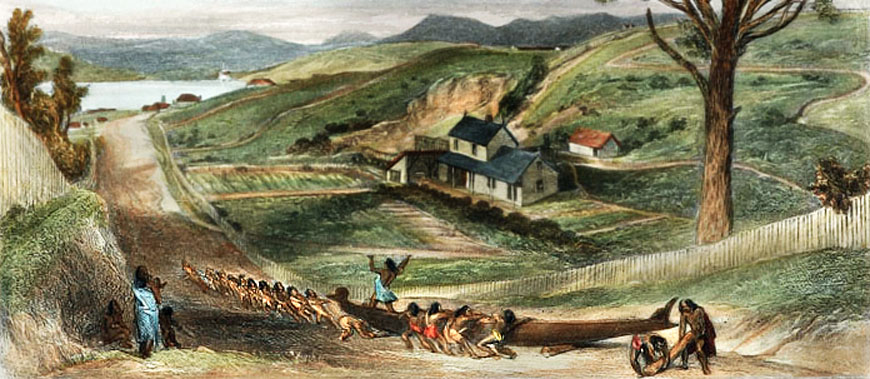|
In
1957, Colquhoun asked the Schillinger Institute in New York
if any American composers knew of songs which nineteenth
century American whalemen had sung while hunting in New
Zealand waters. Several
months later he received a letter containing six
such songs from John Leebrick, an
elderly composer in the United States.
In 1968, Bailey & Roth very pointedly omitted Leebrick's Blood Red Roses from their collection of traditional NZ folk songs 'Shanties By The Way:' it had obviously been concocted from recent songs, one of them composed only a few months earlier. This web document summarizes a 2001-11 thread in Mudcat.org Leebrick's 1957 version.
Colquhoun described this as a halyard shanty1 to be sung very fast. But this is not in the halyard shanty format, and hauling a ship's heavy yard up the mainmast is slow work, and needs a slow, strong beat and simple rhyme. This fast story-telling is a fo'castle entertainment song. Let's see how Leebrick's version
evolved.
Come Down You Bunch o' Roses Azizi
Powell in her
study of customs of
Africans in the Americas, explains that the
Caribbean children's singing game, "Coming Down With A
Bunch Of Roses" referred to girls carrying a bunch of
roses while walking down the row between parallel lines. A
pretty female, or a sweetheart, was referred to as a
"bunch of roses."
Lomax recorded this in Trinidad in 1997.  Annie,
Annie, coming down Annie,
Annie, coming down with a bunch of roses, coming down You walk in style coming down With a bunch of roses, coming down You show me your dress, You show me your hat, You show me your shoes, You dance the rumba You dance the limbo This was danced as a
version of our Virginia Reel, and probably still is.
The children were imitating the courtship dance of young adults, like this one observed in Tobago in 1928 1. Lift up you' clotheses,
comin' dung;
Right up to you' noses, comin' dung. Comin' dung with you' bunch
o'roses,
Comin' dung; x2 2. Gal show me you' motion,
x2
3. Bring in you' lover,
x2 See
more here
In England, a pretty girl was
called an 'English rose.' So a group of English girls, or
one especially pretty girl, may have been called a bunch of
roses. No roses grew in the tropical Caribbean climate, but
African slaves probably learnt the game/dance from English
sugarcane growers, added their faster, stronger, African
rhythms to it, and their children copied them.
The nineteenth century resurgence of work songs at sea began with the recruitment of black seamen who had grown up singing work songs on land. In the Caribean, as in Africa, song and music intertwined with every phase and pattern of human life, including the world of work. Mustrad Captain R.C. Adams, in his chronicle of life On Board the Rocket (1879), on page 65, told of this being sung by the negro crew of an American ship when they were mastheading the maintopsail. A. sentimental forecastle songs Dibden's early 1800s songs giving way to melodies of Africans from the Americas and popular shore songs of the day: B. work songs 1st, for a few strong pulls, eg Haul The Bowline, 2nd, for a long hoists, eg Reuben Ranzo, 3rd, for continuous effort, with a strong Irish influence, eg Paddy on the Railway. Gordon Grant gives a similar Roses version in Windjammer Sketches Alow and Aloft, (1930). He sailed aboard the 'Balclutha' in 1925 and describes this song being used for swaying off: "They have set the main
topgallant staysail. In order to stretch it taut along the
stay one man takes a turn under the belaying pin; the other
two stand on the fife rail, grasp the halliards, and "sway
off," putting all the weight into it. As they bend their
knees, the slack is taken up on the pin and the process
repeated."
Ho, Molly come down,
Come down with your pretty posey, Come down with your cheeks so rosy, Ho, Molly, come down He O! He O! So here's a more authentic
historical version.
Come Down, You Red Red Roses Burl
Ives had found this version in 1955. He released a
recording of it on the 1st of January 1956.
Go Down You Blood Red Roses This
phrase only goes back as far as 1954 when A.L. Lloyd
invented it to help
build up the atmosphere of grim foreboding as the
peg-legged Captain Ahab left port in the
otherwise very authentically filmed Hollywood movie, Moby
Dick, released in 1956.
So when John Leebrick received
a request for South Pacific whaling songs, just after hearing
Burl Ives and watching Moby Dick, and already having collected
a forecastle song about marooned sealers in Fiordland, he must
have decided to create another forecastle song about a gang of
stranded sealers.2
a halyard or halliard is a line
(rope) used to hoist a sail, flag or yard. The term comes from
the Middle English halier = "a rope to haul with."
A 'yard' was the nautical term for a horizontal spar used on square-rigged sailing ships. Because they were very heavy, some yards were lowered in stormy weather to give the ship more stability. After the storm, seamen had the task of hauling the 2-ton yard back up again. On warships there were plenty of men to do this work, but on commercial sailing ships in the 1700s and 1800s, crew numbers were kept small to make more profit. So hauling the yard up with only a few men had to be done in short bursts, with the shortened line fastened after each pull, so a slow but steady shanty gave the timing, and kept the men's spirits up during this backbreaking task. Notice that there was NOT a set number of verses in a true work shanty; the shantyman kept going until the hauling job was finished, either repeating verses, borrowing them from other songs, or ad-libbing. Maori/Polynesian sailors' hauling shanties.These were used to haul a waka
ashore for storage, or to haul a river waka of visitors up into
shallow waters and onto dry land.
I have been "hauled up" onto a Waikato marae with Tenei te TANGATA PuhuruHURU nana i TIKI MAI whakawhiti te RA! a huPANE, a kauPANE! whiti te RA! This chant was also used to haul the 'Tainui' waka ashore after its colonizing voyage from Tahiti, 500 years before Te Rauparaha "composed' it. Here is a longer portaging "hauling shanty" Te tangi te kiwi, KIWI!  A
newly-hewed waka being portaged down
Hawkestone St, Wgtn, in 1845
2. Stranded Sealers Davy Lowston's Jackson Bay gang
was not the only abandoned group: most sealing gangs who worked
the southern bays and islands suffered from lack of food and
exposure to wind and cold, or were completely forgotten.
In 1813 a ship took five men off the Solanders in Foveaux Strait - two had been there since 1808. They had made their own clothing and shelters out of sealskin, and had eaten nothing but seal meat. The Yankee whaler Enterprise rescued three men from the Snares in 1817 who had been set down in 1810 with just an iron pot. Clubbing Seals today This photo was taken in Canada in
the 1980s, but about 25-30,000 baby seals are still clubbed to
death there every year. Baby seals were also killed in Siberia
until the practice was banned in 2009. click
This webpage put onto
folksong.org.nz website in March 2024 |

